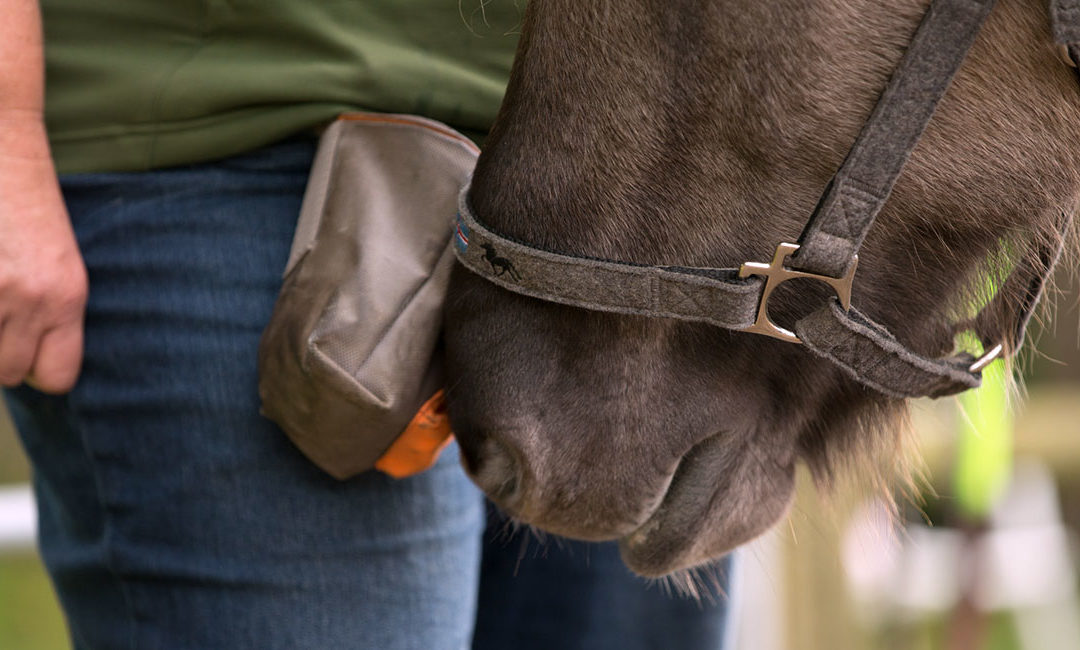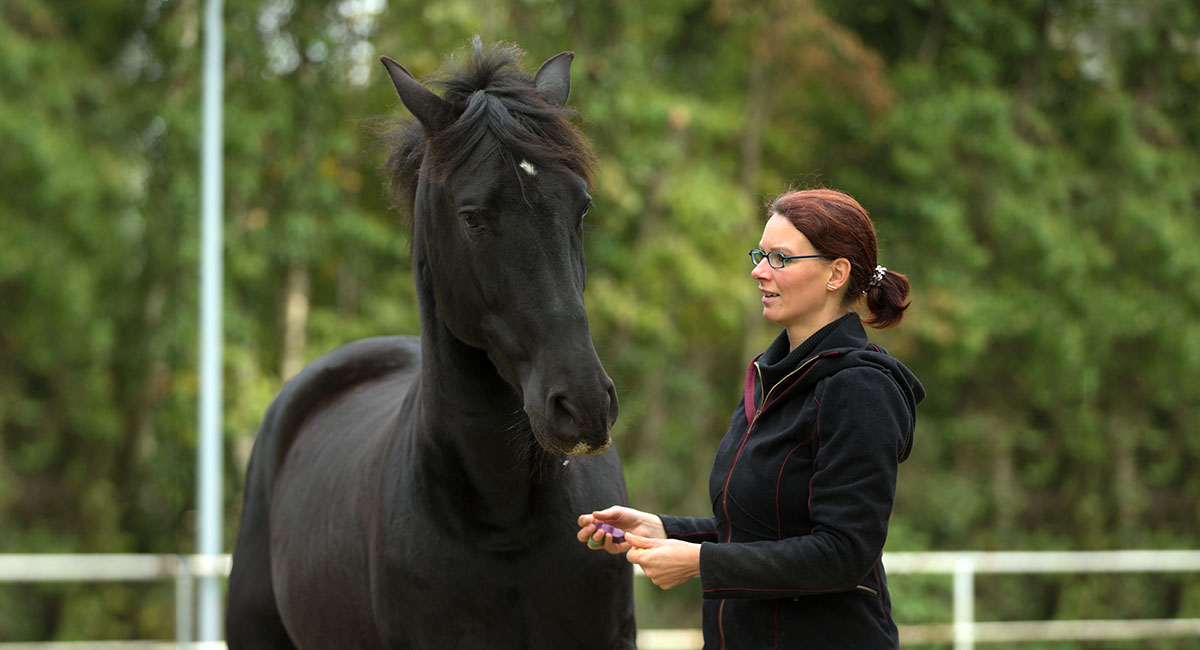Dieser Artikel wurde am 9. April 2025 aktualisiert und auf den neuesten Stand gebracht!
Does your horse mug you all the time, behave “unpolitely” or snap at you? Does it “throw” behavior at you, even if you don’t ask for it? Often, it’s not faulty training, but unfulfilled basic needs, like hunger, if you don’t succeed in your training.
FrustrationFrustration ist eine emotionale Reaktion, die auftritt, wenn ein Lebewesen daran gehindert wird, ein erwartetes Ziel zu erreichen oder eine gewohnte Belohnung zu erhalten. Sie entsteht besonders dann, wenn ein... » Weiterlesen and/or stressStress ist eine körperliche und emotionale Reaktion auf eine Herausforderung, Belastung oder Bedrohung. Er entsteht, wenn ein Lebewesen eine Situation als herausfordernd oder überwältigend wahrnimmt und sich anpassen muss. Stress... » Weiterlesen is one of the most common problems right at the beginning of training with positive reinforcement. And frequently, unfulfilled basic needs play a major role here.
In my experience, hunger is the most common reason for horses to become overexcited around food. A horse that is hungry quickly becomes frustrated. Especially at the beginning, if the criteriaEin Kriterium ist eine klare, einzelne Anforderung, die ein Tier in einem Training erfüllen muss, um eine Verstärkung zu erhalten. Es definiert eine präzise Eigenschaft des erwünschten Verhaltens, beispielsweise die... » Weiterlesen are not yet clear and the horse still has to understand the basic rules of the game, the training can be extremely challenging for the horse. And even if the criteria for the reward are clear, it might be very challenging to develop relaxation and calmness in training.
Often we can observe displacement behaviors, like „snatching“ or even biting. Very often, you will be able to tell that a horse is frustrated by the way the horse takes the food or crowds the trainer and wants to be very close. If the handler is still a beginner, to him/her it can look like „positive reinforcement is not suitable for my horse“ or the person is simply unable to cope and gives up training with food altogether.
Also, problems with stimulusEin Reiz, häufig auch Stimulus genannt, ist eine äußere oder innere Einwirkung, die ein Lebewesen wahrnimmt und die eine Reaktion auslösen kann, aber nicht muss. Reize können aus der Umwelt... » Weiterlesen controlControl (Kontrolle) ist ein fundamentales Grundbedürfnis, da sie einem Individuum die Möglichkeit gibt, aktiv Einfluss auf seine Umwelt und sein eigenes Verhalten zu nehmen. Kontrolle bedeutet, dass Handlungen vorhersehbare und... » Weiterlesen, such as throwing behaviors at the trainer, are strongly influenced by hunger. This is often misinterpreted as the horse being overly motivated and so the horse’s „hardship“ isn’t recognized. For the horse, however, it simply makes no sense to display a behavior permanently if it doesn’t lead to a reinforcer. Every organism behaves for outcome. If there is no outcome, behavior would normally decrease or disappear. So the permanent offering of different behaviors is kind of unnatural.
It is important to take a close look at the basic needs of the horse in case of training problems, even if you think there is no deficit here. Often we do our best to optimize our horses’ living conditions and do not even consider this. However, the feeding of horses with different needs within a group is problematic because individual solutions are often difficult. Or the keeping basically doesn’t match the needs of the horse and the feeding must be regulated. Then often „Slow Feeders“, such as hay nets or „Grazing Muzzles“ are used as exclusive food source, which can entail an often underestimated stress potential. Due to tight meshes or small inlets, the horse might chews less than would be needed to create a feeling of satiation. Or the horse might actually get too little amounts of certain nutrients, so it continues to feel hungry. An increased release of stress hormones, due to frustration during eating also affects training because stress hormones remain in the organism for a relatively long time until they degrade and quickly become a fundamental problem.
Sometimes there is no other option but to limit the food source or to just feed less than the horse would normally need. In this case, a compromise should be found. This also means that you need to muster much more time,patience and of course, a lot of understanding for your horse’s behavior. But be aware that if this kind of problems affects your training, it clearly indicates a major impairment in the horse’s life and thus a major health risk. Chronic stress affects the whole organism both physically, and mentally and can have serious short- and longterm consequences . Sometimes there is no optimal solution and you have to decide what to settle for(e.g. if a slightly overweight horse is less of a problem than a permanently stressed, frustrated horse). In fact, sometimes the only feasible solution is changing the environment in order to provide suitable living conditions, even if this means to move the horse to another stable, in case the problems can’t be resolved otherwise and no acceptable compromise can be found.
Anyone suspecting that the above could apply to their horse, should experimentally feed a large portion of hay, hay cubes or other forage (taking into account what the horse is allowed to eat) before training. After a short break (15 to 60 minutes) observe whether the behavior of the horse changes during training. A food deficit (= hunger) is very likely, if the horse now is more concentrated or calmer, if it takes the food more carefully after a short while and if training mistakes can be ruled out, . In this case, it makes sense to feed at least a small portion before training, until a long-term solution has been found, in order to set especially horses new to +R training up for success .
In addition, frustration can lead to aggression, which causes a potential risk of getting hurt. During the first sessions of positive training, especially if there is a corresponding history with problematic behaviour , I highly recommend training behind a barrier (i.e. in protected contact), and to initially train simple behaviors such as touching a targetEin Target ist ein sichtbares Objekt oder eine Körperstelle, auf die das Tier gezielt reagieren soll, indem es sie berührt oder folgt. Es dient als Orientierungshilfe im Training und ermöglicht... » Weiterlesen or just standing still, facing forward. This is also a good choice for unexperienced horses and trainers, as not only does the human feel safer, but it also prevents people from getting into situations in which they are tempted to defend themselves with punishment, causing further stress.
Also, the change between training and pausing should be introduced right from the start, since the training with positive reinforcement for the horse – and also for the human – is exhausting and the ability to focus usually decreases after a few minutes. At the start, the sessions should last only a few minutes and the pause should at least be as long as the training sessions. To further reduce stress, the horse should also have access to hay / roughage and water during the sessions and the value of the reinforcers should be comparable to that of the freely accessible food. In case of increasing stress, the horse is likely to use the opportunity to eat the offered food, rather than crowding the human and/or becoming more frustrated because of the food reward. This provides choice and control for the horse and prevents emotional pressure, which is important for a relaxed training setting.
Of course, not only deficits in feeding can cause stress. Unfulfilled basic needs such insufficient movement opportunities or an unsatisfied wish to play caused by an unfavorable herd constellation also influence the stress factor. Just like in us humans, the foundation for a pleasant learning experience lies in the fulfillment of basic needs.
Special thanks to Iris Stamberger for her help with the translation!


